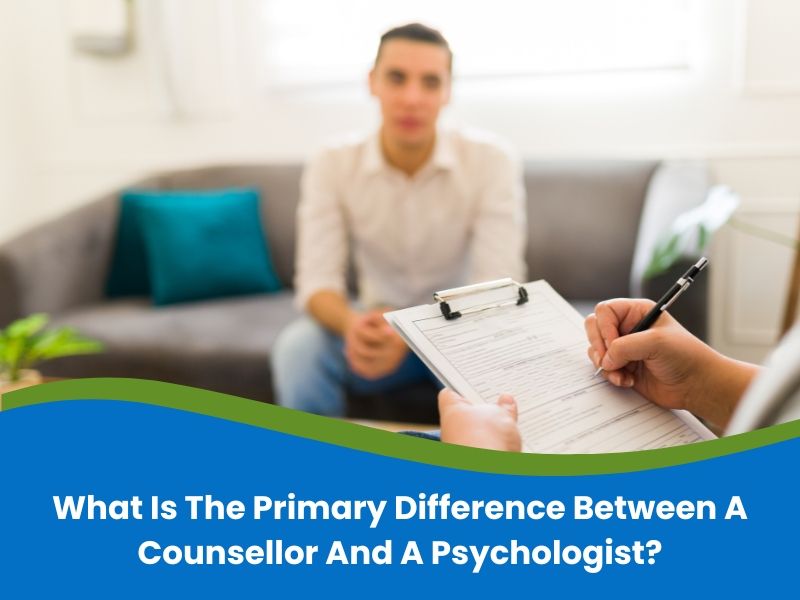When it comes to seeking help for mental health, knowing whether to see a counsellor or a psychologist can be confusing. Both professionals play essential roles in mental health care, but their training, approaches, and services differ significantly. This guide will explore the counsellor vs psychologist debate to help you make an informed decision. By understanding their distinct roles, you can better navigate the mental health services available to you and choose the right professional for your needs.
What Does a Counsellor Do?
- Overview of a Counsellor’s Role: Counsellors focus on providing support and guidance for a variety of personal and emotional issues. They help clients develop coping strategies, build resilience, and improve their overall well-being. Counsellors often work with individuals facing life transitions, relationship issues, stress, and other personal challenges. Their goal is to empower clients to find solutions and make positive changes in their lives.
- Typical Settings Where Counsellors Work: You can find counsellors in various settings, including schools, private practices, community centres, and workplaces. In schools, they assist students with academic and personal concerns. In private practices, they offer individual, couple, and group therapy. Community centres provide accessible counselling services to diverse populations. Workplace counsellors help employees manage stress and improve their work-life balance.
What Does a Psychologist Do?
- Overview of a Psychologist’s Role: Psychologists are trained to diagnose and treat mental health conditions using evidence-based therapies. They help clients understand and manage their psychological issues through various therapeutic techniques. Psychologists conduct assessments, develop treatment plans, and provide therapy for conditions such as anxiety, depression, and other mental health disorders. Their work often involves in-depth exploration of clients’ thoughts, feelings, and behaviours to address the root causes of their issues.
- Typical Settings Where Psychologists Work: Psychologists commonly work in hospitals, mental health clinics, private practices, and academic settings. In hospitals and clinics, they collaborate with other healthcare professionals to provide comprehensive care. Private practices allow psychologists to offer personalised therapy sessions. Academic settings involve teaching and conducting research to advance the field of psychology.
How Are the Qualifications for a Counsellor vs Psychologist Different?
- Education and Training Requirements: Counsellors typically hold a diploma or degree in counselling, often complemented by supervised practice. Their training focuses on developing practical skills to support clients effectively. Psychologists, however, must complete a minimum of six years of university education, including a master’s or doctoral degree. Their training includes extensive coursework, research, and clinical experience to diagnose and treat complex mental health conditions.
- Professional Licensing and Certification: Counsellors must meet the standards set by professional bodies, such as the Australian Counselling Association (ACA). Certification involves adhering to ethical guidelines and participating in continuing education. Psychologists require registration with the Australian Health Practitioner Regulation Agency (AHPRA) and must adhere to strict professional guidelines. Registration ensures that psychologists maintain high standards of practice and keep up-to-date with the latest advancements in the field.
When Should You See a Counsellor vs Psychologist?
- Types of Issues Addressed by Counsellors: Counsellors are ideal for addressing life transitions, relationship issues, stress, and general personal development. They provide a supportive environment for clients to explore their feelings and develop coping strategies. Counsellors can help you navigate changes, improve communication, and build healthier relationships.
- Types of Issues Addressed by Psychologists: Psychologists are suited for treating more complex mental health conditions, such as depression, anxiety, and severe behavioural issues. They use mental health assessment tools to diagnose conditions accurately and develop comprehensive treatment plans. If you’re dealing with long-term mental health challenges or need a formal diagnosis, a psychologist is the right choice.
How Does the Approach of a Counsellor vs Psychologist Differ?
-
- Techniques and Methods Used by Counsellors: Counsellors use person-centred, solution-focused, and cognitive-behavioural techniques. Their approach is usually short-term and goal-oriented, helping clients achieve specific outcomes. Counsellors may also incorporate mindfulness and stress management techniques to support clients’ overall well-being.
- Techniques and Methods Used by Psychologists: Psychologists employ various therapeutic methods, including cognitive-behavioural therapy (CBT), psychodynamic therapy, and humanistic approaches. Their treatments are often long-term and involve in-depth exploration of issues. Psychologists may also use specialised therapies, such as dialectical behaviour therapy (DBT) or eye movement desensitisation and reprocessing (EMDR), to address specific conditions.
Are There Differences in Treatment Duration with a Counsellor vs Psychologist?
-
- Short-Term vs Long-Term Treatment: Counselling is generally short-term, focusing on immediate issues and solutions. Sessions may last a few weeks to several months, depending on the client’s needs and goals. Counsellors work with clients to develop practical strategies for overcoming challenges and achieving personal growth. For more detailed information on the specifics of these services, Learn more about our psychology services.
- Frequency of Sessions: Psychological treatment can be long-term, depending on the complexity of the condition. Sessions are often more frequent, especially during the initial stages of treatment. Psychologists may see clients weekly or bi-weekly to provide intensive support and monitor progress. If you’re wondering which type of treatment is best suited for your needs, check out the difference between a counsellor and a psychologist to help make an informed decision.
What Are the Costs Associated with Seeing a Counsellor vs Psychologist?
- Cost Comparison: Generally, seeing a counsellor is less expensive than seeing a psychologist. Counsellors often charge lower fees per session, making their services more accessible for those on a budget. However, the cost can vary depending on the counsellor’s qualifications and location.
- Insurance and Medicare Rebates: Psychologists’ services are often covered by Medicare and private health insurance, making them more accessible despite higher fees. Many Australians use the Medicare Better Access scheme for psychological services, which provides rebates for up to 10 sessions per year. This scheme helps reduce the out-of-pocket costs for seeing a psychologist, making it more affordable for individuals needing long-term treatment.
Summary of Counsellor vs Psychologist Differences
The difference between a counsellor vs a psychologist primarily lies in their training, approach, and the types of issues they address. Counsellors provide support for personal and emotional issues, using short-term, goal-oriented methods. Psychologists, on the other hand, are trained to diagnose and treat complex mental health conditions using various therapeutic techniques.
Making the Right Choice for Your Needs
Consider your specific needs when choosing between a counsellor and a psychologist. If you’re dealing with life transitions or relationship issues, a counsellor may be the right choice. For more severe mental health conditions, a psychologist can provide the necessary diagnosis and treatment. Understanding your needs and the services offered by these professionals will help you make an informed decision.
How to Get Started with a Counsellor or Psychologist
Getting started is simple. Determine your needs and choose the professional best suited to help you. If in doubt, reach out to a mental health provider for guidance. At Auburn Health, we offer both counselling and psychological services to cater to a wide range of mental health needs.
Contact Us for Further Guidance
For personalised advice and support, Contact Auburn Health for expert advice. Our team of experienced counsellors and psychologists are here to help you navigate your mental health journey. Whether you need counsellor vs psychologist assistance, we’re ready to guide you towards the right choice for your well-being. The right support can make all the difference in managing your mental health and achieving a better quality of life. So, don’t hesitate to reach out and take the first step towards your well-being today.




